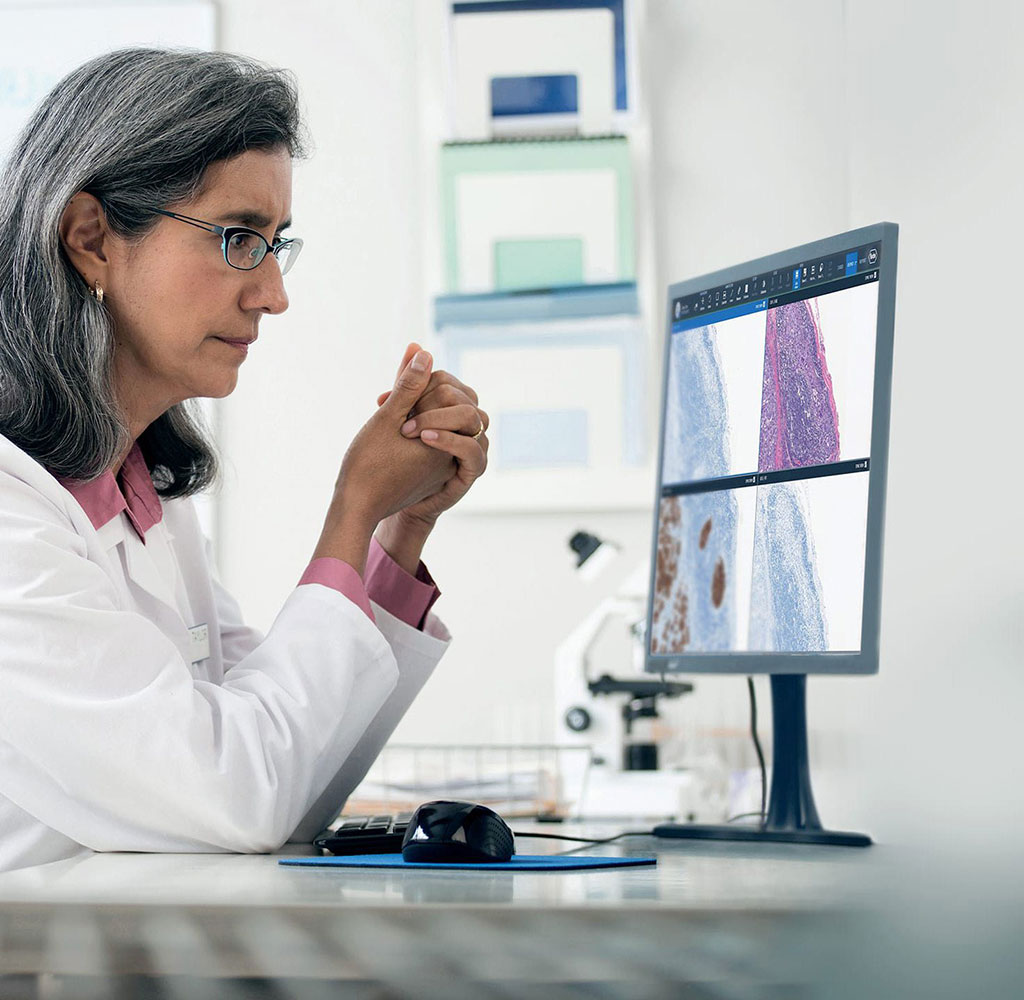Roche and BMS Collaborate on Digital Pathology Algorithms and Cancer Diagnostic Assays
Posted on 28 Mar 2022
Advances in computation and artificial intelligence (AI) in digital pathology are showing promise to meet the demand for more accurate and comprehensive assessment of pathology results to enable improved patient outcomes. Whole slide imaging, combined with modern AI-based image analysis tools, have the potential to transform the practice of pathology. The use of AI and deep learning methods to interpret whole slide images in digital pathology enables pathologists to derive novel and meaningful diagnostic insights from tissue samples. AI-based image analysis automates quantitative tasks and enables fast, repeatable evaluation of information-rich tissue images that are sometimes difficult to interpret manually. AI-based image analysis uncovers aspects that are invisible to the human eye and reduces the risk of human error. Patients, whose tissue samples are analyzed using AI-based image analysis, can benefit from a faster and more accurate diagnosis. The insights gained from these analyses can help pathologists determine the best treatment option for cancer patients. Now, a new collaboration builds on commitment to advance personalized healthcare by helping to improve access to new treatment options for patients with solid tumors.
Roche (Basel, Switzerland) has entered into a collaboration with Bristol Myers Squibb (BMY, New York, NY, USA) to support the advancement of two assays for use in clinical trials with the development and deployment of two new digital pathology algorithms. Roche is delivering an end-to-end digital pathology solution from tissue staining to producing high-quality digital images that can be reliably assessed using automated clinical image analysis algorithms. Roche offers two deployment options for its uPath software: an on-premise solution and a cloud solution, marketed as NAVIFY Digital Pathology. The VENTANA DP 200 slide scanner and Roche uPath enterprise software are CE-IVD marked for in-vitro diagnostic use.

In the first project under this collaboration, Roche Digital Pathology is creating an AI-based image analysis algorithm to aid pathologists in interpreting the on-market VENTANA PD-L1 (SP142) Assay. BMY Squibb will use this algorithm to generate biomarker data from clinical trial samples. In the second project, Roche will leverage its recently announced Open Environment collaboration with PathAI to integrate a PathAI-developed algorithm for CD8 biomarker analysis into the NAVIFY Digital Pathology workflow software. The AI-powered algorithm will be used by BMY to analyze clinical trial samples that have been stained with Roche's CD8 assay and generate quantitative spatial biomarker data. Data from both projects will be used to aid in cancer diagnosis and to advance personalized healthcare treatment options, with the aim of improving outcomes for patients. Pathology imaging tools based on AI can help to support clinical trials in the investigation of targeted therapy options. Expanding access to these innovative imaging tools through the Roche Digital Pathology Open Environment can potentially enable more precise diagnoses, improved clinical decision-making and lead to more personalized treatment strategies.
"The Bristol Myers Squibb and PathAI collaborations are among the first examples where AI technology and digital pathology applications are playing a role in developing treatments for patients. By using our NAVIFY Digital platform to interpret tissue based assays and AI algorithms, pathologists are better able to identify targeted therapy options, ultimately improving patient care," said Jill German, Head of Roche Diagnostics Pathology Customer Area.
"We believe digital methods will bring significant improvements in standardisation and interpretation of tissue-based assays and will enable broader access to tissue based assays. The ability to more deeply interrogate images will present opportunities to better understand disease biology, potentially leading to expanded and improved drug development options and ultimately highly effective patient selection strategies," said Sarah Hersey, Vice President, Translational Sciences and Diagnostics, Bristol Myers Squibb. "We are pleased to be part of this collaboration that is using leading edge technology to enable improved patient outcomes."
Related Links:
Roche
Bristol Myers Squibb













